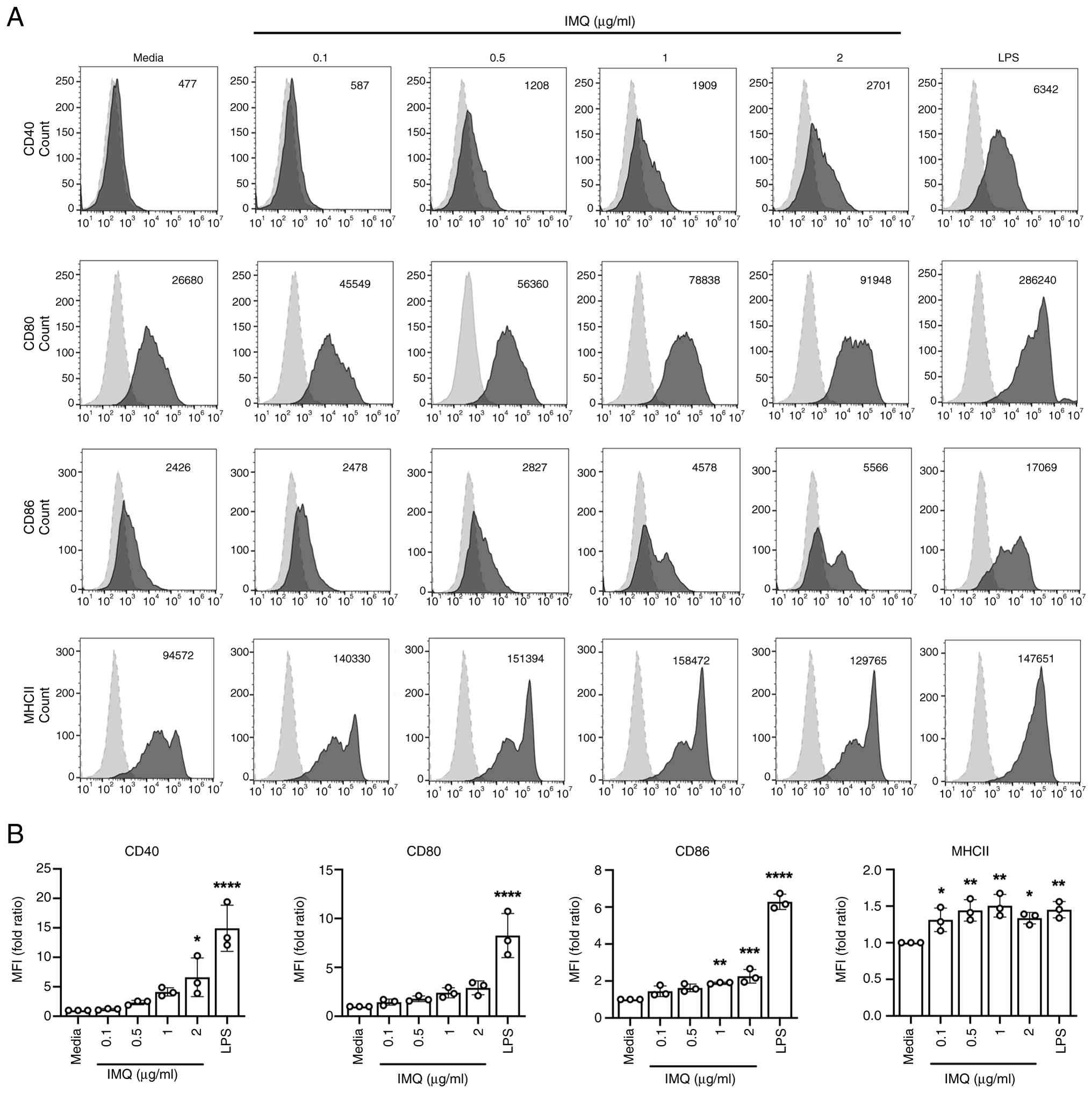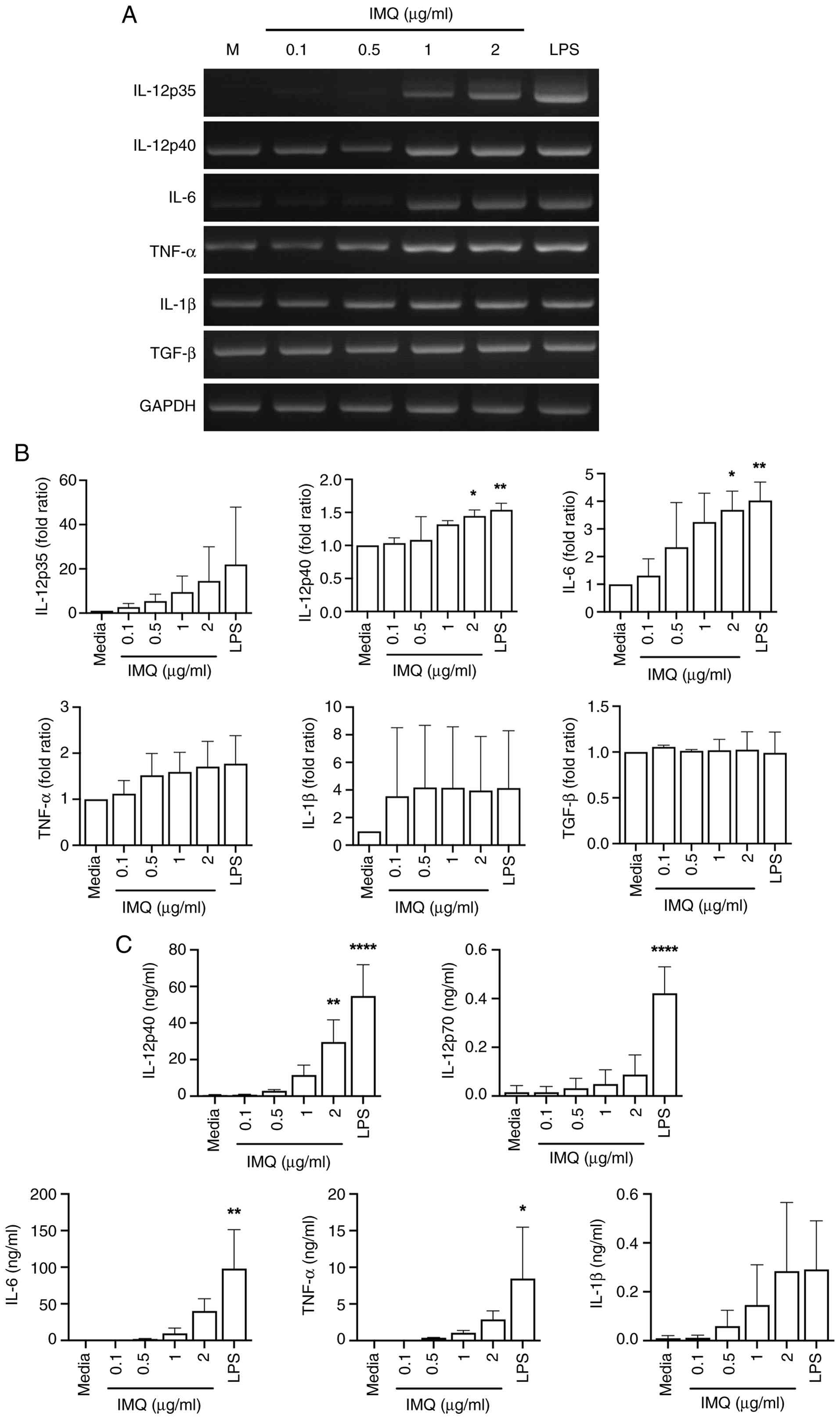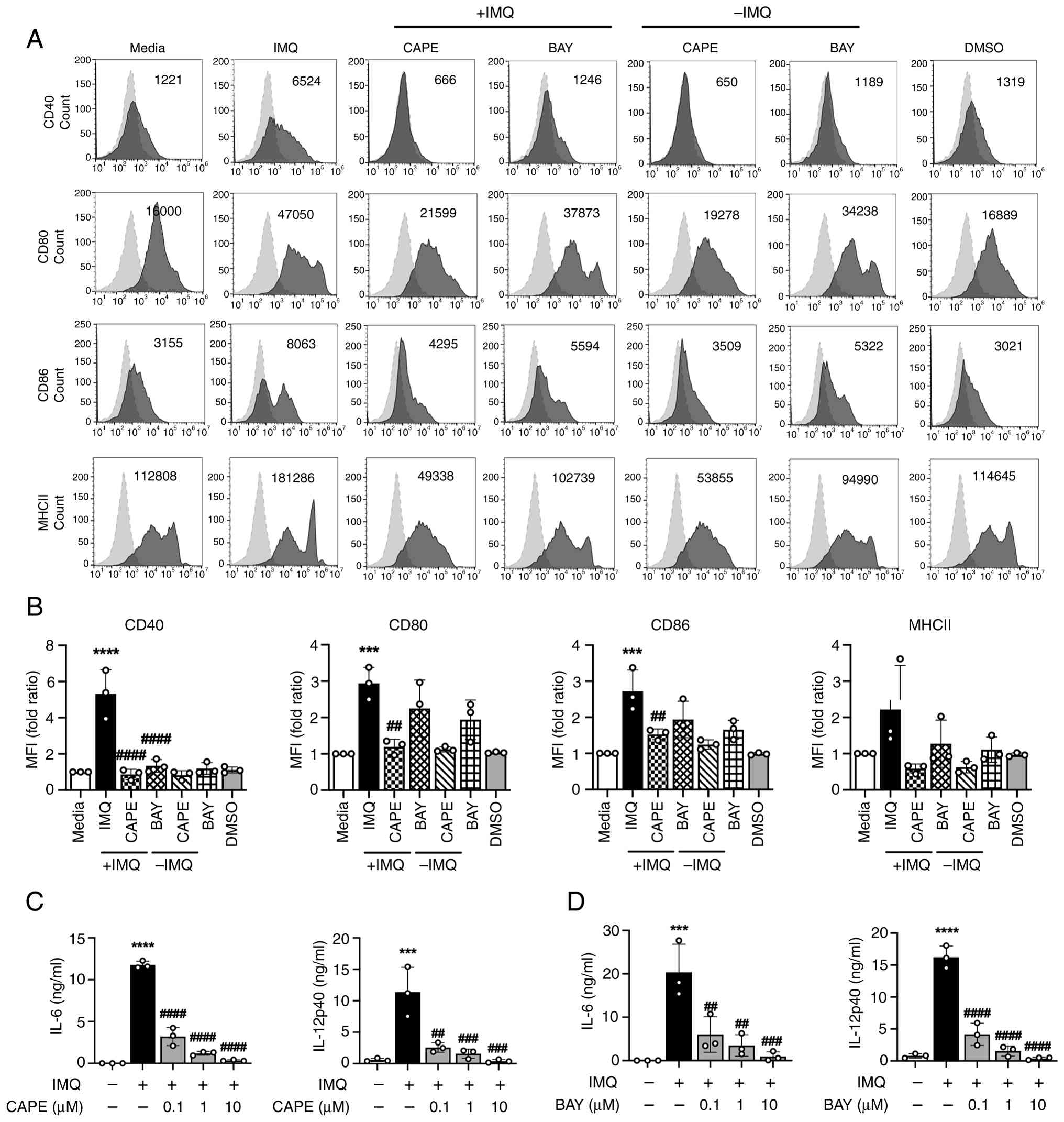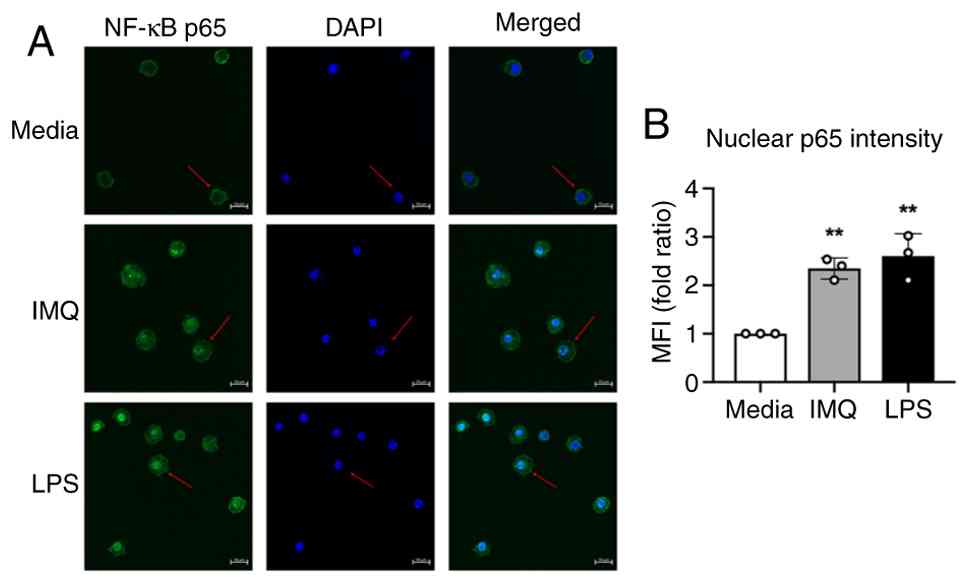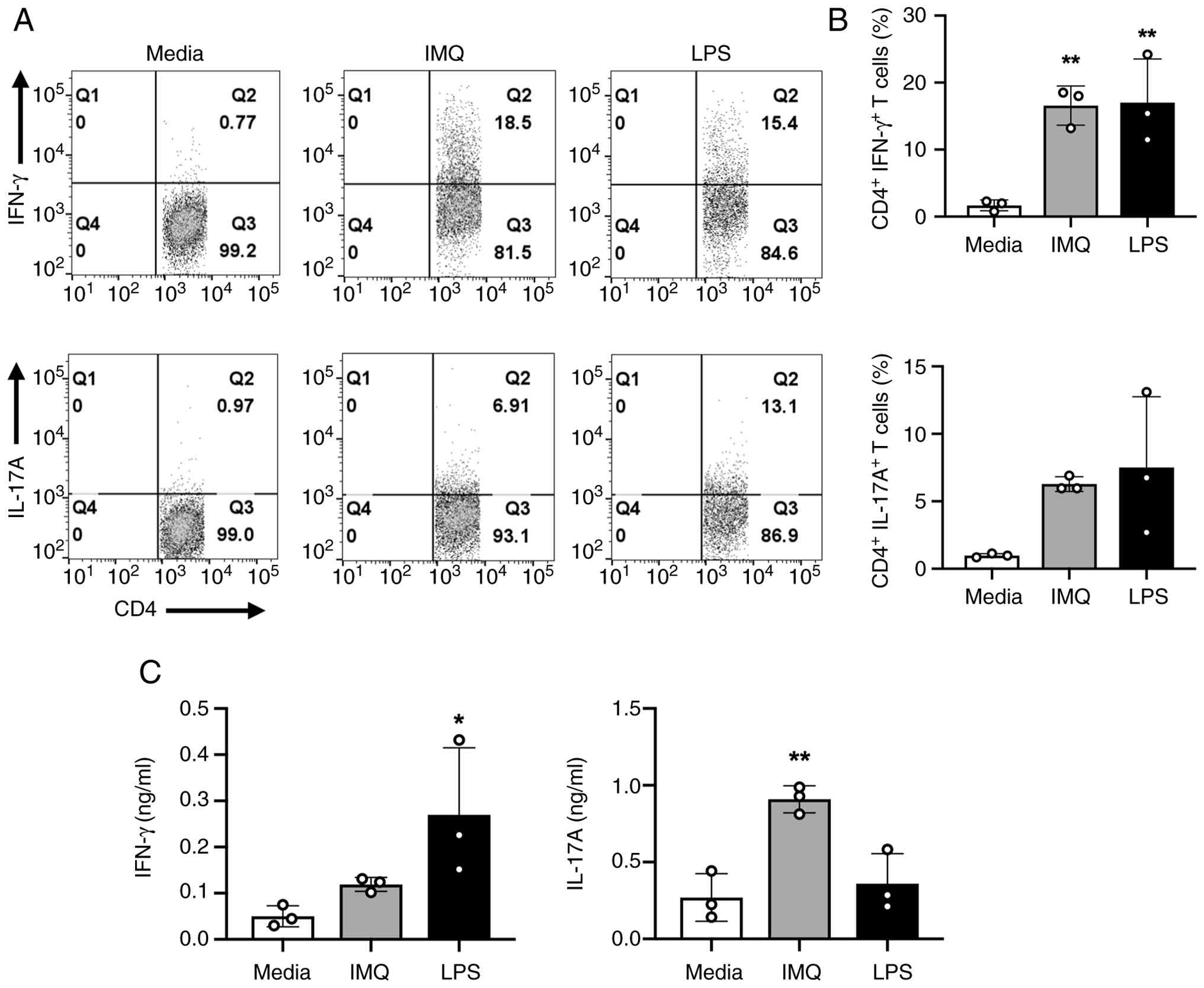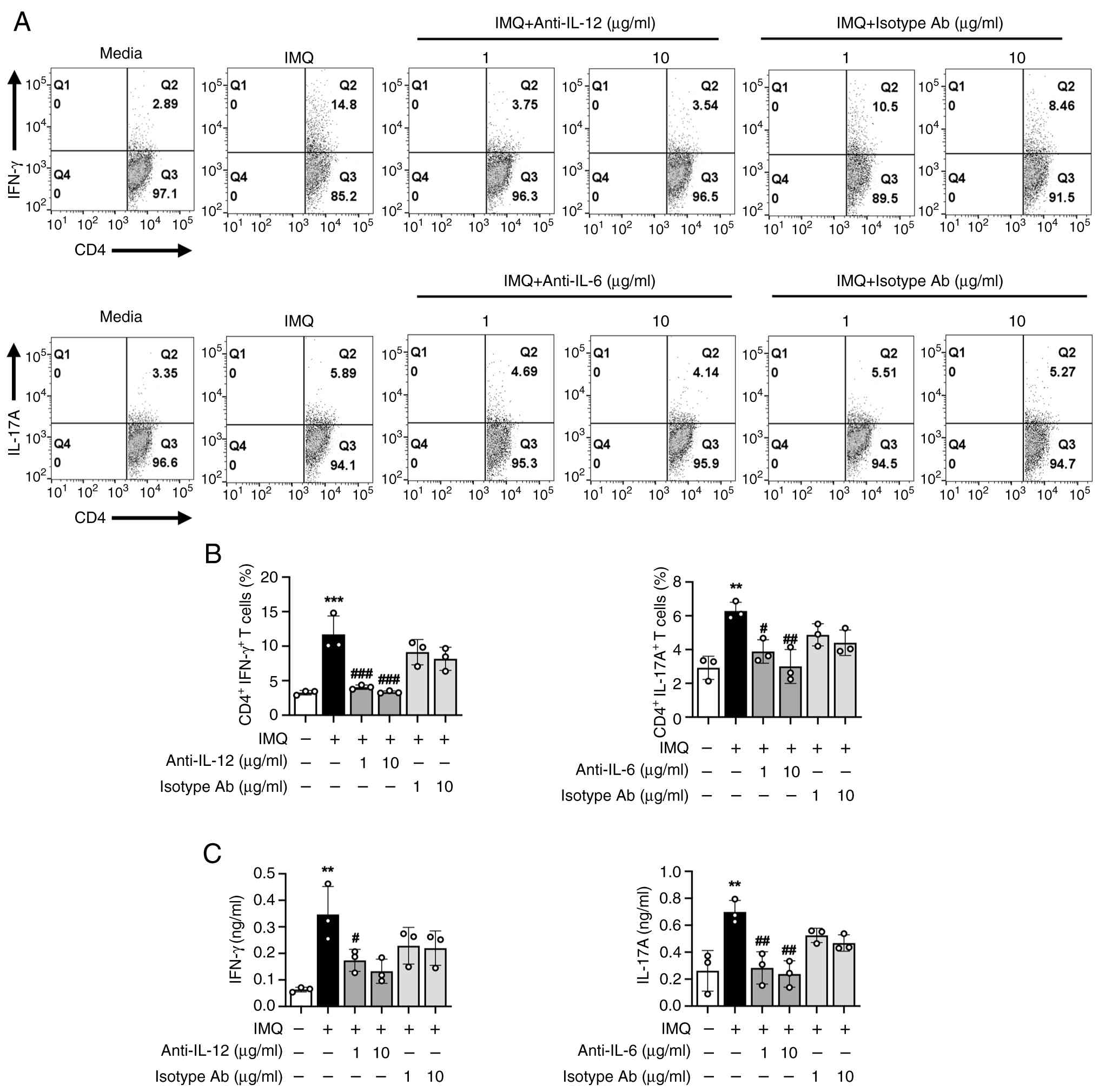|
1
|
Damiani G, Bragazzi NL, Karimkhani Aksut
C, Wu D, Alicandro G, McGonagle D, Guo C, Dellavalle R, Grada A,
Wong P, et al: The global, regional, and national burden of
psoriasis: Results and insights from the global burden of disease
2019 study. Front Med (Lausanne). 8(743180)2021.PubMed/NCBI View Article : Google Scholar
|
|
2
|
Parisi R, Iskandar IY, Kontopantelis E,
Augustin M, Griffiths CE and Ashcroft DM: Global Psoriasis Atlas.
National, regional, and worldwide epidemiology of psoriasis:
Systematic analysis and modelling study. BMJ.
369(m1590)2020.PubMed/NCBI View Article : Google Scholar
|
|
3
|
Armstrong AW and Read C: Pathophysiology,
clinical presentation, and treatment of psoriasis: A review. JAMA.
323:1945–1960. 2020.PubMed/NCBI View Article : Google Scholar
|
|
4
|
Griffiths CE, Armstrong AW, Gudjonsson JE
and Barker JNWN: Psoriasis. Lancet. 397:1301–1315. 2021.PubMed/NCBI View Article : Google Scholar
|
|
5
|
Zhou X, Chen Y, Cui L, Shi Y and Guo C:
Advances in the pathogenesis of psoriasis: From keratinocyte
perspective. Cell Death Dis. 13(81)2022.PubMed/NCBI View Article : Google Scholar
|
|
6
|
Man AM, Orăsan MS, Hoteiuc OA,
Olănescu-Vaida-Voevod MC and Mocan T: Inflammation and psoriasis: A
comprehensive review. Int J Mol Sci. 24(16095)2023.PubMed/NCBI View Article : Google Scholar
|
|
7
|
Schön MP: Adaptive and innate immunity in
psoriasis and other inflammatory disorders. Front Immunol.
10(1764)2019.PubMed/NCBI View Article : Google Scholar
|
|
8
|
Kamata M and Tada Y: Dendritic cells and
macrophages in the pathogenesis of psoriasis. Front Immunol.
13(941071)2022.PubMed/NCBI View Article : Google Scholar
|
|
9
|
Patel U, Mark NM, Machler BC and Levine
VJ: Imiquimod 5% cream induced psoriasis: A case report, summary of
the literature and mechanism. Br J Dermatol. 164:670–672.
2011.PubMed/NCBI View Article : Google Scholar
|
|
10
|
Wu JK, Siller G and Strutton G: Psoriasis
induced by topical imiquimod. Australas J Dermatol. 45:47–50.
2004.PubMed/NCBI View Article : Google Scholar
|
|
11
|
Parab S and Doshi G: The experimental
animal models in psoriasis research: A comprehensive review. Int
Immunopharmacol. 117(109897)2023.PubMed/NCBI View Article : Google Scholar
|
|
12
|
Van Der Fits L, Mourits S, Voerman JSA,
Kant M, Boon L, Laman JD, Cornelissen F, Mus AM, Florencia E, Prens
EP and Lubberts E: Imiquimod-induced psoriasis-like skin
inflammation in mice is mediated via the IL-23/IL-17 axis. J
Immunol. 182:5836–5845. 2009.PubMed/NCBI View Article : Google Scholar
|
|
13
|
Wohn C, Ober-Blöbaum JL, Haak S,
Pantelyushin S, Cheong C, Zahner SP, Onderwater S, Kant M,
Weighardt H, Holzmann B, et al: Langerinneg conventional dendritic
cells produce IL-23 to drive psoriatic plaque formation in mice.
Proc Natl Acad Sci USA. 110:10723–10728. 2013.PubMed/NCBI View Article : Google Scholar
|
|
14
|
Rendon A and Schäkel K: Psoriasis
pathogenesis and treatment. Int J Mol Sci. 20(1475)2019.PubMed/NCBI View Article : Google Scholar
|
|
15
|
Yin X, Chen S and Eisenbarth SC: Dendritic
cell regulation of T helper cells. Annu Rev Immunol. 39:759–790.
2021.PubMed/NCBI View Article : Google Scholar
|
|
16
|
Gutcher I and Becher B: APC-derived
cytokines and T cell polarization in autoimmune inflammation. J
Clin Invest. 117:1119–1127. 2007.PubMed/NCBI View Article : Google Scholar
|
|
17
|
Tai Y, Wang Q, Korner H, Zhang L and Wei
W: Molecular mechanisms of T cells activation by dendritic cells in
autoimmune diseases. Front Pharmacol. 9(642)2018.PubMed/NCBI View Article : Google Scholar
|
|
18
|
Qu Y, Li D, Xiong H and Shi D:
Transcriptional regulation on effector T cells in the pathogenesis
of psoriasis. Eur J Med Res. 28(182)2023.PubMed/NCBI View Article : Google Scholar
|
|
19
|
Jang S, Kwon EJ and Lee JJ: Rheumatoid
arthritis: Pathogenic roles of diverse immune cells. Int J Mol Sci.
23(905)2022.PubMed/NCBI View Article : Google Scholar
|
|
20
|
Wagner CA, Roqué PJ and Goverman JM:
Pathogenic T cell cytokines in multiple sclerosis. J Exp Med.
217(e20190460)2020.PubMed/NCBI View Article : Google Scholar
|
|
21
|
Liu T, Zhang L, Joo D and Sun SC: NF-κB
signaling in inflammation. Signal Transduct Target Ther.
2(17023)2017.PubMed/NCBI View Article : Google Scholar
|
|
22
|
Athie-Morales V, Smits HH, Cantrell DA and
Hilkens CMU: Sustained IL-12 signaling is required for Th1
development. J Immunol. 172:61–69. 2004.PubMed/NCBI View Article : Google Scholar
|
|
23
|
Pidala J, Beato F, Kim J, Betts B, Jim H,
Sagatys E, Levine JE, Ferrara JLM, Ozbek U, Ayala E, et al: In vivo
IL-12/IL-23p40 neutralization blocks Th1/Th17 response after
allogeneic hematopoietic cell transplantation. Haematologica.
103:531–539. 2018.PubMed/NCBI View Article : Google Scholar
|
|
24
|
Zhou L, Lopes JE, Chong MMW, Ivanov II,
Min R, Victora GD, Shen Y, Du J, Rubtsov YP, Rudensky AY, et al:
TGF-beta-induced Foxp3 inhibits T(H)17 cell differentiation by
antagonizing RORgammat function. Nature. 453:236–240.
2008.PubMed/NCBI View Article : Google Scholar
|
|
25
|
Cao L, Deng J, Chen W, He M, Zhao N, Huang
H, Ling L, Li Q, Zhu X and Wang L: CTRP4/interleukin-6 receptor
signaling ameliorates autoimmune encephalomyelitis by suppressing
Th17 cell differentiation. J Clin Invest.
134(e168384)2023.PubMed/NCBI View Article : Google Scholar
|
|
26
|
Deng Y, Wang Z, Chang C, Lu L, Lau CS and
Lu Q: Th9 cells and IL-9 in autoimmune disorders: Pathogenesis and
therapeutic potentials. Hum Immunol. 78:120–128. 2017.PubMed/NCBI View Article : Google Scholar
|
|
27
|
Inaba K, Inaba M, Romani N, Aya H, Deguchi
M, Ikehara S, Muramatsu S and Steinman RM: Generation of large
numbers of dendritic cells from mouse bone marrow cultures
supplemented with granulocyte/macrophage colony-stimulating factor.
J Exp Med. 176:1693–1702. 1992.PubMed/NCBI View Article : Google Scholar
|
|
28
|
Hilligan KL and Ronchese F: Antigen
presentation by dendritic cells and their instruction of CD4+ T
helper cell responses. Cell Mol Immunol. 17:587–599.
2020.PubMed/NCBI View Article : Google Scholar
|
|
29
|
Bol KF, Schreibelt G, Rabold K, Wculek SK,
Schwarze JK, Dzionek A, Teijeira A, Kandalaft LE, Romero P, Coukos
G, et al: The clinical application of cancer immunotherapy based on
naturally circulating dendritic cells. J Immunother Cancer.
7(109)2019.PubMed/NCBI View Article : Google Scholar
|
|
30
|
Brasel K, De Smedt T, Smith JL and
Maliszewski CR: Generation of murine dendritic cells from
flt3-ligand-supplemented bone marrow cultures. Blood. 96:3029–3039.
2000.PubMed/NCBI
|
|
31
|
Shortman K and Naik SH: Steady-state and
inflammatory dendritic-cell development. Nat Rev Immunol. 7:19–30.
2007.PubMed/NCBI View Article : Google Scholar
|
|
32
|
Xu Y, Zhan Y, Lew AM, Naik SH and Kershaw
MH: Differential development of murine dendritic cells by GM-CSF
versus Flt3 ligand has implications for inflammation and
trafficking. J Immunol. 179:7577–7584. 2007.PubMed/NCBI View Article : Google Scholar
|
|
33
|
Lellahi SM, Azeem W, Hua Y, Gabriel B, Rye
KP, Reikvam H and Kalland KH: GM-CSF, Flt3-L and IL-4 affect
viability and function of conventional dendritic cell types 1 and
2. Front Immunol. 13(1058963)2023.PubMed/NCBI View Article : Google Scholar
|
|
34
|
Ouaaz F, Arron J, Zheng Y, Choi Y and Beg
AA: Dendritic cell development and survival require distinct
NF-kappaB subunits. Immunity. 16:257–270. 2002.PubMed/NCBI View Article : Google Scholar
|
|
35
|
Andres-Ejarque R, Ale HB, Grys K, Tosi I,
Solanky S, Ainali C, Catak Z, Sreeneebus H, Saklatvala J, Dand N,
et al: Enhanced NF-κB signaling in type-2 dendritic cells at
baseline predicts non-response to adalimumab in psoriasis. Nat
Commun. 12(4741)2021.PubMed/NCBI View Article : Google Scholar
|
|
36
|
Alam MM, Yang D, Trivett A, Meyer TJ and
Oppenheim JJ: HMGN1 and R848 synergistically activate dendritic
cells using multiple signaling pathways. Front Immunol.
9(2982)2018.PubMed/NCBI View Article : Google Scholar
|
|
37
|
Natarajan K, Singh S, Burke TR Jr,
Grunberger D and Aggarwal BB: Caffeic acid phenethyl ester is a
potent and specific inhibitor of activation of nuclear
transcription factor NF-kappa B. Proc Natl Acad Sci USA.
93:9090–9095. 1996.PubMed/NCBI View Article : Google Scholar
|
|
38
|
Pierce JW, Schoenleber R, Jesmok G, Best
J, Moore SA, Collins T and Gerritsen ME: Novel inhibitors of
cytokine-induced IkappaBalpha phosphorylation and endothelial cell
adhesion molecule expression show anti-inflammatory effects in
vivo. J Biol Chem. 272:21096–21103. 1997.PubMed/NCBI View Article : Google Scholar
|
|
39
|
Harrington LE, Hatton RD, Mangan PR,
Turner H, Murphy TL, Murphy KM and Weaver CT: Interleukin
17-producing CD4+ effector T cells develop via a lineage
distinct from the T helper type 1 and 2 lineages. Nat Immunol.
6:1123–1132. 2005.PubMed/NCBI View
Article : Google Scholar
|
|
40
|
Schön MP and Erpenbeck L: The
interleukin-23/interleukin-17 axis links adaptive and innate
immunity in psoriasis. Front Immunol. 9(1323)2018.PubMed/NCBI View Article : Google Scholar
|
|
41
|
Wu R, Zeng J, Yuan J, Deng X, Huang Y,
Chen L, Zhang P, Feng H, Liu Z, Wang Z, et al: MicroRNA-210
overexpression promotes psoriasis-like inflammation by inducing Th1
and Th17 cell differentiation. J Clin Invest. 128:2551–2568.
2018.PubMed/NCBI View Article : Google Scholar
|
|
42
|
Zeng J, Lei L, Zeng Q, Yao Y, Wu Y, Li Q,
Gao L, Du H, Xie Y, Huang J, et al: Ozone therapy attenuates
NF-κB-mediated local inflammatory response and activation of Th17
cells in treatment for psoriasis. Int J Biol Sci. 16:1833–1845.
2020.PubMed/NCBI View Article : Google Scholar
|
|
43
|
Leung S, Liu X, Fang L, Chen X, Guo T and
Zhang J: The cytokine milieu in the interplay of pathogenic
Th1/Th17 cells and regulatory T cells in autoimmune disease. Cell
Mol Immunol. 7:182–189. 2010.PubMed/NCBI View Article : Google Scholar
|
|
44
|
Murugaiyan G, Beynon V, Pires Da Cunha A,
Joller N and Weiner HL: IFN-γ limits Th9-mediated autoimmune
inflammation through dendritic cell modulation of IL-27. J Immunol.
189:5277–5283. 2012.PubMed/NCBI View Article : Google Scholar
|
|
45
|
Kaplan MH: Th9 cells: Differentiation and
disease. Immunol Rev. 252:104–115. 2013.PubMed/NCBI View Article : Google Scholar
|
|
46
|
Goswami R and Kaplan MH: A brief history
of IL-9. J Immunol. 186:3283–3288. 2011.PubMed/NCBI View Article : Google Scholar
|
|
47
|
Mostafa A, Sakurai K, Murata T, Dainichi
T, Tian H, Yodoi J and Kabashima K: Recombinant human thioredoxin
ameliorates imiquimod-induced psoriasis-like dermatitis in mice. J
Dermatol Sci. 116:55–58. 2024.PubMed/NCBI View Article : Google Scholar
|
|
48
|
Kim N, Lee S, Kang J, Choi YA, Lee B, Kwon
TK, Jang YH and Kim SH: Hispidulin alleviates imiquimod-induced
psoriasis-like skin inflammation by inhibiting splenic Th1/Th17
cell population and keratinocyte activation. Int Immunopharmacol.
87(106767)2020.PubMed/NCBI View Article : Google Scholar
|
|
49
|
Liu R, Du S, Zhao L, Jain S, Sahay K,
Rizvanov A, Lezhnyova V, Khaibullin T, Martynova E, Khaiboullina S
and Baranwal M: Autoreactive lymphocytes in multiple sclerosis:
Pathogenesis and treatment target. Front Immunol.
13(996469)2022.PubMed/NCBI View Article : Google Scholar
|
|
50
|
Clark RA and Schlapbach C: TH9
cells in skin disorders. Semin Immunopathol. 39:47–54.
2017.PubMed/NCBI View Article : Google Scholar
|
|
51
|
Jabeen R and Kaplan MH: The symphony of
the ninth: The development and function of Th9 cells. Curr Opin
Immunol. 24:303–307. 2012.PubMed/NCBI View Article : Google Scholar
|
|
52
|
Xu L, Kitani A, Fuss I and Strober W:
Cutting edge: Regulatory T cells induce CD4+CD25-Foxp3-T cells or
are self-induced to become Th17 cells in the absence of exogenous
TGF-beta. J Immunol. 178:6725–6729. 2007.PubMed/NCBI View Article : Google Scholar
|
|
53
|
Zhou X, Bailey-Bucktrout S, Jeker LT and
Bluestone JA, Martínez-Llordella M, Ashby M, Nakayama M, Rosenthal
W and Bluestone JA: Instability of the transcription factor Foxp3
leads to the generation of pathogenic memory T cells in vivo. Nat
Immunol. 10:1000–1007. 2009.PubMed/NCBI View Article : Google Scholar
|
|
54
|
Khmaladze I, Kelkka T, Guerard S, Wing K,
Pizzolla A, Saxena A, Lundqvist K, Holmdahl M, Nandakumar KS and
Holmdahl R: Mannan induces ROS-regulated, IL-17A-dependent
psoriasis arthritis-like disease in mice. Proc Natl Acad Sci USA.
111:E3669–E3678. 2014.PubMed/NCBI View Article : Google Scholar
|
|
55
|
Singh TP, Zhang HH, Hwang ST and Farber
JM: IL-23- and imiquimod-induced models of experimental psoriasis
in mice. Curr Protoc Immunol. 125(e71)2019.PubMed/NCBI View Article : Google Scholar
|



